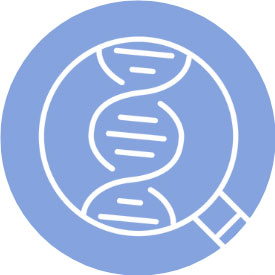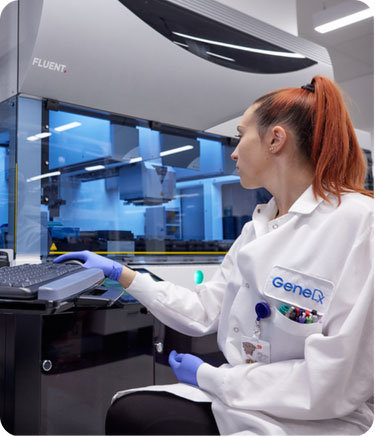New AAP Guidance: Exome and genome sequencing recommended as first-line tests. Learn more

GO BEYOND THE DIAGNOSIS
Genomic sequencing reveals the “why” behind autism, helping you deliver more targeted care and better outcomes.
A diagnosis is only part of the story. Our genomic testing can reveal the cause behind your patient’s autism.

Panel and CMA tests can miss many genes tied to autism
Providers often lean on tests like chromosomal microarray (CMA), Fragile X (FMR1), and single- or multi-gene panel tests for answers. But those only look at a fraction of the 1,000+ genes linked to autism.
Our genomic tests give you the full picture
By looking at ~20,000 disease-causing genes at once, our exome testing offers insights that others can overlook–delivered in concise reports that are easy for you to act on.
In a study of 18,000+ patients with autism, 90% received negative results from at least one prior genetic test. This highlights how broader testing can zoom in on answers that other tests miss.
Autism often goes hand in hand with other conditions. Exome testing makes it easier for you to connect the clinical dots.
ASD is rarely an island. Nearly 3 out of 4 patients have at least one co-occurring condition, such as intellectual disability (ID) or epilepsy.6
for patients managing ASD and other co-occurring features such as ID, congenital anomalies, or epilepsy.1,4,7
Genetic answers can shape care, ease uncertainty, and empower families navigating autism.
Genetic testing for ASD can8:

Provide genetic diagnoses

Identify areas of need and opportunities for support

Guide more personalized care, treatment, and medication decisions

Determine any co-occurring conditions

Connect families to gene-related support groups and resources

Call out recurrence risks that inform family planning
From data to diagnosis—with confidence.

Our database includes 1.5M+ unique samples, including 850K+ sequenced exomes and genomes. Half of that data is based on non-European ancestry to best reflect a diverse patient population.

The ACMG9, NSGC10, and AAP11 recommend or endorse exome and genome testing as first-line tests for multiple indications. Read them here.

Our team of clinical and genetic experts are here throughout the process—from education and guidance to results interpretation and next steps.

See how one test delivered answers for Oliver and gave him a clear path forward.
There are 1,000 genes currently linked to ASD–and counting.12,13
A diagnosis of autism itself may be an indication for genetic testing. For patients with autism who have co-occurring conditions, genetic testing is indicated based on guidelines and recommendations from professional organizations like the American College of Medical Genetics and Genomics (ACMG) and the American Academy of Pediatrics (AAP). Genetic testing can be considered at the time of the autism diagnosis.
Tests like chromosomal microarray (CMA), Fragile X (FMR1), and panel tests only look at a fraction of the 1,000+ genes linked to autism. Exome and genome sequencing looks at 20,000+ genes–and exome testing has a diagnostic yield of around 16% for ASD,4 compared to 1% for Fragile X,2 3% for CMA,2 and 3-10% for multi-gene panel tests.3
Our genome sequencing test includes screening for repeat expansion disorders in a number of genes, including FMR1. If you start with exome sequencing and receive a negative result, the same sample can then be tested for FMR1.
When genome sequencing is appropriate based on coverage, we include Fragile X in our testing to make it even more efficient and comprehensive.
Our reflex testing option allows you to send a single sample for exome sequencing, plus automatic Fragile X testing if the exome test results in a negative diagnosis. This cuts down the need for multiple tests and shortens the time to actionable answers.
Over 90% of commercially insured lives have coverage for outpatient exome sequencing when criteria are met. We’re in network with many commercial and government payors, making genomic testing accessible for more patients. See if your patients are covered.
Resources like our Patient Access Solutions can help ease financial stress and offset out-of-pocket costs.
Our dedicated team of genetic counselors, doctors, and genetic experts are here for you and your patients at every step of the testing process, including:
*Case study is based on GeneDx patient testing, with all identifying information removed.
References: 1. Lindy A, et al. Poster Presented at: AAN 2022 Annual Meeting; April 24-26, 2022; Seattle, WA. 2. Arteche-López A, et al. Genes. 2021(12):560. 3. Ní Ghrálaigh F, et al. J Autism Dev Disord. 2023 Jan;53(1):484-488. 4. Srivastava S et al. Genet Med. 2019 Nov;21(11):2413–2421. 5. Trost B, et al. Cell. 2022 Nov 10;185(23):4409-4427.e18. doi: 10.1016/j.cell.2022.10.009. 6. Khachadourian, V et al. Transl Psychiatry 13, 71 (2023). 7. Tammimies K, et al. JAMA. 2015;314:895–903. 8. Savatt JM and Myers SM. Front Pediatr. 2021 Feb 19;9:526779. 9. Manickam K, et al. Genet Med. 2021;23(11):2029-2037. 10. Smith L, et al. J Genet Couns. 2022 Oct 24. 11. Rodan LH, et al. Pediatrics. 2025; e2025072219. doi:10.1542/peds.2025-072219. 12. Genovese AC, Butler MG. Behavioral and Psychiatric Disorders in Syndromic Autism. Brain Sci. 2024 Mar 30;14(4):343. doi: 10.3390/brainsci14040343. 13. Satterstrom, Frederick, et al. The largest to-date exome study of autism spectrum disorder triples the number of autism-associated genes. Presented at: American Society of Human Genetics 2024; Nov 8; Denver, CO